Ubya
International Hazard
    
Posts: 1247
Registered: 23-11-2017
Location: Rome-Italy
Member Is Offline
Mood: I'm a maddo scientisto!!!
|
|
Rotary Vane Vacuum Pump Rebuild
It's been a while folks.
I haven't had the inspiration to do some chemistry experiments in a while, but a few days ago i found a discord server where one of the members showed
some irradiated inorganic salts. I knew about irradiated salt (mainly sodium chloride), and of course I wanted to make some on my own, but with my
current gamma source I calculated it would take me about 2000 years to make a batch, bummer.
This guy didn't use gamma radiation though, he used an electron beam, "I can do that!" I thought.
In a dopamine fueled burst of hyperactivity, I gathered all my plasma/vacuum stuff and trying cobbling together an electron gun. As one would expect,
many things didn't work on my first try, mainly my vacuum pump.
Regular maintenance is a must on all kinds of equipment, vacuum pumps too, I knew that, and still didn't do it.
Well after 6 years untouched, the vacuum it produced was absolutely terrible. I thought that it was time for an oil change, and oh boy it needed it.
I changed the dark red oil, but staring me from the bottom of the random cup I used to harvest the oil, there were many pieces of something, something
you really don't want to see in a machine that relies on very tight tolerances....
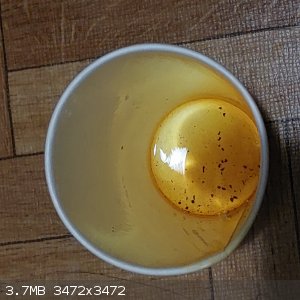
I run the pump again, hoping that the new oil would infuse new life in it. The vacuum was even worse than before
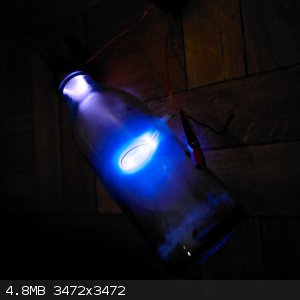
I don't have yet a real gauge to measure the pressure inside my system, so I rely on watching at the behaviour of the plasma inside my test crookes
tube. That glowing ring, very close to the anode ring, means the vacuum is shit.
The dread was real, and my dopamine was plummeting, so I decided to deeply clean and inspect my vacuum pump, because even if the chances of breaking
it for good were high, it was useless to me as it was.
I started taking it apart, and it was immediately visible, a think layer of sludge/rust at the bottom of the oil reservoir. Very Very bad, the whole
case is in aluminium, the only thing made out of steel is the actual rotary vane.
I cleaned every spect of dirt i could see, and then started disassembling the heart of the pump
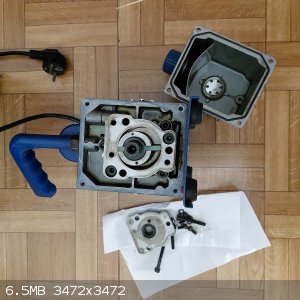
Rotor and blades looked fine to me, but I could clearly see rust between the plates that made the pump assembly. I took it apart piece by piece, and
sanded the faces of each piece with 1200 grit sandpaper on a glass pane until i got to a mirror-ish finish.
I can't take more than a hair off the surface, tight tolerances!
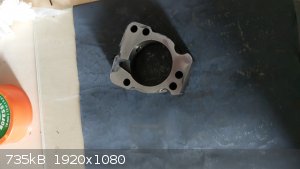
It wasn't fun at all, covered in oil, sanding for 3 hours.
I used an acetone bath to clean off all metal particles now covering each part.
I then oiled back all the pieces and put the whole pump back together.
I of course then had to disassemble it again because the pump would stall when I tested it. I screwed some bolts a bit too tight, and the alignment of
the blades was a bit off. On the second try, the pump run fine.
I didn't have new oil at hand, so I decanted the oil I charged before and loaded that in the pump.
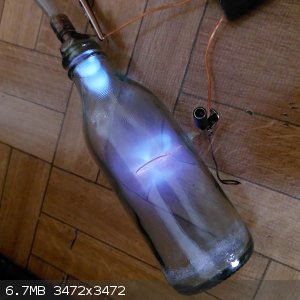
Bigger ring means much better vacuum, still not the level i need, but it is usable now. Maybe with a new charge of better oil, it can perform even
better than it did 6 years ago.
If i can manage to make some irradiated salts, you'll hear from me here for sure
[Edited on 17-5-2023 by Ubya]
---------------------------------------------------------------------
feel free to correct my grammar, or any mistakes i make
---------------------------------------------------------------------
|
|
|
Texium
Administrator
       
Posts: 4621
Registered: 11-1-2014
Location: Salt Lake City
Member Is Online
Mood: PhD candidate!
|
|
Nice work! I’ve rebuilt many vacuum pumps, and it is indeed an oily, hateful job. With the cheap ones like yours, it’s possibly worth just buying
a new pump. 
Soon at work I’m going to be tackling an absolute beast- a Welch 1402N. We got it for free from another research lab that abused it heavily until it
seized. Once it’s fixed up we’ll use it in a high vac system for removing the last traces of stubborn solvents from products.
|
|
|
Ubya
International Hazard
    
Posts: 1247
Registered: 23-11-2017
Location: Rome-Italy
Member Is Offline
Mood: I'm a maddo scientisto!!!
|
|
Quote: Originally posted by Texium  | Nice work! I’ve rebuilt many vacuum pumps, and it is indeed an oily, hateful job. With the cheap ones like yours, it’s possibly worth just buying
a new pump. 
Soon at work I’m going to be tackling an absolute beast- a Welch 1402N. We got it for free from another research lab that abused it heavily until it
seized. Once it’s fixed up we’ll use it in a high vac system for removing the last traces of stubborn solvents from products.
|
You are totally right, I remember paying 60 bucks for this pump, and after all this work, it still isn't what I need. I fixed it mainly out of guilt,
and I also never leave the opportunity to disassemble a piece of equipment I've never worked on. There's always something to learn, better to do it on
a 60 bucks pump than an expensive piece of equipment.
Good luck with your pump, it's always nice to see new life in something that would have been thrown away as broken
---------------------------------------------------------------------
feel free to correct my grammar, or any mistakes i make
---------------------------------------------------------------------
|
|
|
charley1957
Hazard to Others
  
Posts: 168
Registered: 18-2-2012
Location: Texas
Member Is Offline
Mood: Beginning to cool off
|
|
I recently went to a university garage sale and bought a pallet that had a steam cooker and a Welch 1402 vacuum pump on it. Took it home and found
nothing wrong with it but the power switch was dirty and it wouldn’t come on. Works perfectly. I scrapped the steam cooker, paid $15 for the whole
mess.
You can’t claim you drank all day if you didn’t start early in the morning.
|
|
|
Texium
Administrator
       
Posts: 4621
Registered: 11-1-2014
Location: Salt Lake City
Member Is Online
Mood: PhD candidate!
|
|
Wow, that’s a great deal! If you haven’t already, I highly recommend draining the oil and refilling with some quality vacuum pump oil. I don’t
know what the capacity is off the top of my head, but it’ll take the better part of a gallon at least. Maybe more. Since you don’t know what
it’s been through in the past, changing the oil is the best way to ensure that it’ll keep working going forward.
Also, side note, I’m curious what university it was, because when I lived in Texas I tried seeking out university surplus sales, but everywhere I
looked either didn’t do them publicly or it was difficult to get info about them.
|
|
|
Ubya
International Hazard
    
Posts: 1247
Registered: 23-11-2017
Location: Rome-Italy
Member Is Offline
Mood: I'm a maddo scientisto!!!
|
|
Quote: Originally posted by Texium  |
Also, side note, I’m curious what university it was, because when I lived in Texas I tried seeking out university surplus sales, but everywhere I
looked either didn’t do them publicly or it was difficult to get info about them. |
I've read of many people just buying surplus or broken stuff from universities. I could only manage to get a few empty reagent bottles, and that was
only because I became friend with one of the lab techs.
My department every year calls a disposal company, they park behind our building with a big truck, and every lab throws there their old/broken stuff.
I managed to be there only one time, and after asking and getting a few weird looks, I brought home a broken 50W RF resistor. They throw away so much
stuff, spectrophotometers, random equipment, i'm sure most could be fixed quite easily, it just isn't worth it for universities to pay someone to fix
something that is already old. just an excuse to buy a new shiny piece of equipment lol
---------------------------------------------------------------------
feel free to correct my grammar, or any mistakes i make
---------------------------------------------------------------------
|
|
|
Texium
Administrator
       
Posts: 4621
Registered: 11-1-2014
Location: Salt Lake City
Member Is Online
Mood: PhD candidate!
|
|
Indeed. The University of Utah is great because they have a permanent brick and mortar surplus store. I’ve bought some cool equipment there, such as
a nice recirculating chiller for only $50. I’ve also seen large lab ovens (too large for me), centrifuges, spectrophotometers, variacs, mantles, and
more. And I’ve bought non-chemistry things like stereo equipment and furniture from there at great prices too.
I was curious about universities in Texas specifically because when I lived there I was unable to find such sales despite seeking them out.
|
|
|
charley1957
Hazard to Others
  
Posts: 168
Registered: 18-2-2012
Location: Texas
Member Is Offline
Mood: Beginning to cool off
|
|
Texium, this was at Sul Ross State University in Alpine in far West Texas. Ironically, I later worked at that university for three years and during
that time I was not able to procure anything except a small beaker and a single half-gallon dark reagent bottle. They wouldn’t toss or otherwise get
rid of their empty reagent bottles, they kept them for waste disposal. I knew the guy who put on the surplus sales but he was really slow and
overworked and never had a sale while I worked there. He’d let me peruse all he’d collected for the sale but I moved on before he ever had another
one.
You can’t claim you drank all day if you didn’t start early in the morning.
|
|
|
Texium
Administrator
       
Posts: 4621
Registered: 11-1-2014
Location: Salt Lake City
Member Is Online
Mood: PhD candidate!
|
|
Ah, nice. Sul Ross definitely wasn’t on my radar for surplus sales since I lived in central Texas. I’ve been to Alpine several times though, as
I’ve taken many trips to Big Bend. Lovely area.
|
|
|
Dr.Bob
International Hazard
    
Posts: 2759
Registered: 26-1-2011
Location: USA - NC
Member Is Online
Mood: Mildly disgruntled scientist
|
|
Rebuilding a Welch is a pain, but those are my favorite vacuum pumps. We used to have a bunch of those years ago, now where I work we have smaller
and crappier ones than that, so I miss them even more. And the guy who used to fix them and maintain them retired, so we have almost no help now
with them. But a Welch will last for years, we have some that are likely from the 80s or 90's still in use. They really suck.
|
|
|
arkoma
Redneck Overlord
      
Posts: 1763
Registered: 3-2-2014
Location: On a Big Blue Marble hurtling through space
Member Is Offline
Mood: украї́нська
|
|
My old two stage Robinair has locked up on me several times and i have been lucky enough that disassembly and good cleaning got it going and it still
"sucks" nicely.
"We believe the knowledge and cultural heritage of mankind should be accessible to all people around the world, regardless of their wealth, social
status, nationality, citizenship, etc" z-lib
|
|
|
Organikum
resurrected
    
Posts: 2339
Registered: 12-10-2002
Location: Europe
Member Is Offline
Mood: frustrated
|
|
The ones I dismantled had all a trapezoid oil-pump at the end of the shaft, you have none? Also I found after making one out of two and putting it
together that it pulled lousy vacuum so I dissasembled it again and took a much a closer look.
First: Fhe vanes where stuck, the must move freely.
Second: I discovered five or six very small oil-channels which were all blocked. Most in the fromt-cover of the pump assembly but some in the big
block too. Difficult to find but not hard to clean with a copper wire and copious swearing.
After this I got better vacuum then it had when new. was also the cheapest one-stage Chinese kind.
For your purposes you will need a two stage pump or you put two one-stage ones in row. Not suited for pumping condensables they say, well, with some
needle valves and bleeding air in it works just fine. They are cheap, so what?
|
|
|